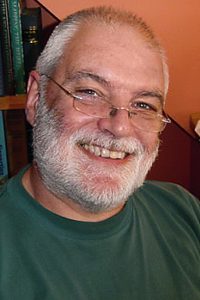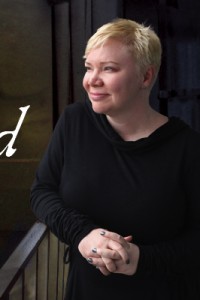Review of 2019 African SFF by Geoff Ryman
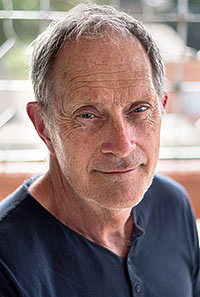
The year 2019 saw the growth of interest in African fiction pay off in terms of publications of novels.
The biggest news of the year may be that Tade Thompson’s Rosewater won the Arthur C. Clarke Award. This year also saw the publication of the second and third books in the Wormwood series, The Rosewater Insurrection and The Rosewater Redemption. Thompson also published a new novella about Molly Southbourne, The Survival of Molly Southbourne.
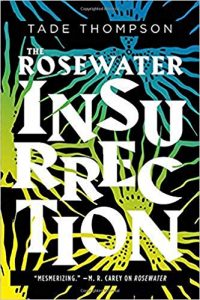 Rosewater won the first Ilube Nommo Award in 2017. Another Ilube Nommo winner, Tochi Onyebuchi had the first in a new series published, War Girls, an adventure story set in a 2170s Nigeria. Ilube Nommo Award 2019 winner Akwaeke Emezi saw publication of their YA novel Pet.
Rosewater won the first Ilube Nommo Award in 2017. Another Ilube Nommo winner, Tochi Onyebuchi had the first in a new series published, War Girls, an adventure story set in a 2170s Nigeria. Ilube Nommo Award 2019 winner Akwaeke Emezi saw publication of their YA novel Pet.
The accomplished Do You Dream of Terra-Two by Temi Oh appeared in 2019 (depending what country you’re in). It is straight-up SF, with convincing space travel and unexpectedly dramatic characters. In some ways Oh is an African heir to the tradition of Kim Stanley Robinson – humanist SF with technical savvy. The book’s great strength is psychological insight into the plight of its young, almost-abused crew. Like so many literary-aware African works, the novel is open ended, caring more about character than plot. Highly recommended.
Wayétu Moore is a novelist with a Liberian background. Her excellent She Would Be King granted spiritual powers to three different characters – one indigenous African, one American, and one Caribbean – to tell a wide-ranging story of Liberia’s foundation. I was reminded of Jennifer Nansubuga Makumbi’s Kintu in that this feels like a novel about an entire nation, a foundational text. Highly recommended.
Namwali Serpell’s The Old Drift mixed SF with magic realism for a literary novel with a speculative twist. Serpell won the 2015 Caine Prize, and in 2019 won the Brittle Paper Award for Essays & Think Pieces.
Successful crime writer Leye Adenle turned his hand to science fiction with The Beautiful Side of the Moon.
Newcomer Myles Ojabo lives in New Zealand. His spiritual-realist novel Black River is set in the days of American slavery, with elements based on Idoma culture.
Eugen Bacon lives in Australia. A prolific writer of short stories, she published her first novel in 2019, the magical literary Claiming T-Mo. Set on a slave ship but with a spiritual twist, Black Opal by Gloria Ogo is that rare thing: a speculative novel first published by a Nigerian press.
From South Africa’s Umuzi came Triangulum, a dystopian mash up of historical and science fiction by Masande Ntshanga. In 2015, Ntshanga was a Caine Prize nominee for his SF-influenced story “Space”.
It was a good year for Nerine Dorman. Her novella The Firebird won the 2019 Nommo and her novel Sing Down the Stars won a Sanlam Prize for Youth Literature. She published two novels in 2019, the second being The Company of Birds.
Suyi Davies Okungbowa broke out with David Mogo, Godhunter – with more major news from him to follow in 2020. Okungbowa’s success bodes well for other young African writers.
Yet of the 17 authors of novels, novellas, and short stories shortlisted for the Nommo Awards 2019, only two were by black writers still living on the continent. One of them was this year’s short story winner Ekpeki Oghenechovwe Donald, for his story “The Witching Hour”.
Omenana, the leading Africa-based SFF journal, managed two issues in 2019. It published 14 short stories, some by leading lights Dilman Dila, Mame Bougouma Diene, Chikodili Emelumadu, Wole Talabi, and Mazi Nwonwu. Newer writers in the magazine included Keletso Mopai, Shingai Kagunda, and Haku Jackson. All Omenana stories are available for free on their website. Issue 13 was the last to be edited by Chinelo Onwualu, who has moved to Canada. This distinguished editor will be missed. She is also an established author with a story “What the Dead Man Said” published this year in Slate.
After the death of founder Emeka Walter Dinjos, Sub-Saharan magazine returned, but no longer dedicated to speculative fiction, though it published stories by Ishola Abdulwasiu Ayodele and Yazeed Dezele’.
The African online journal, Brittle Paper, published some speculative fiction amid literary news and discussion, including a new short story by Acan Innocent Immaculate, “Songbird”. Acan had previously been shortlisted for the 2017 Nommo Award. The journal also published a new series, “The Witches of Auchi” by Anthony Azekwoh.
Brittle Paper gave its 2019 award for fiction to Ope Adedeji’s “After the Birds”, a speculative story published in McSweeney’s Quarterly, no less. Also shortlisted for the Brittle Paper prize was ‘Pemi Aguda, who had a story in the Granta blog.
The Pan-African collective Jalada Africa published two of its themed anthologies this year, After+Life and Bodies. The ongoing existence of Jalada may help to fill the gap left when Kwani? went quiet.
Many Western-based journals published short fiction by Africans in 2019. Apex magazine published “A Fool’s Baneful Gallantry” by Nommo nominee Derek Lubangakene. Suyi Davies Okungbowa contributed “Dune Song” and Wole Talabi “Necessary and Sufficient Conditions” as well as the first English version of “When We Dream We Are Our Own God.” Beneath Ceaseless Skies published “Fael” by Tobi Ogundiran – not his only publication of the year. Cosmic Roots and Eldritch Shores published Innocent Chizaram Ilo’s story “Red Crows”. Online horror magazine The Dark has become something of a go-to journal for young Africans. Tobi Ogundiran had another story “The Muse of Palm House” published by them. Osahon Ize-Iyamu sold four stories this year, one of them “Therein Lies a Soul” to this journal. The Dark also published Idza Luhumyo’s “On Full Moon Nights”, and Tlotlo Tsamaase’s “Who Will Clean Our Spirits When We’re Gone?”
Fireside Quarterly published Innocent Chizaram Ilo’s story “Female Computer Wanted, Apply Within”. Suyi Davies Okungbowa’s “The Haunting of 13 Olúwo Street” also appeared there.
Fiyah scooped Nommo winner T.L. Huchu’s only story for this year, “Corialis”. Rafeeat Aliyu, another established name, published “The Daemon King of Engim” with them. Writers unknown to me until this year included Omar William Sow with “Ibrahima and the Green Fishing Net” and “Gloss” by Kola Heyward-Rotimi.
Strange Horizons has long championed African SFF. In April they published a special Nigerian issue with two stories, “The Storm Painter” by Ayodele Olofintuade and “Where the Rain Mothers Are” by Rafeeat Aliyu. Osahon Ize-Iyamu sold two stories to them, “Who has Never Loved a Gentle House” and “Flags Flying Before a Fall”.
It was a good year for single-author collections.
Wole Talabi’s collection Incomplete Solutions finally appeared. It showcases the range of his work from hard SF, to spiritual realism, to experimental literary stories. “Wednesday’s Story” won the ROSL Readers’ Award in 2018 and “The Regression Test” won the Nommo also last year. In years when the AfroSF series doesn’t publish, novellas can be thin on the ground. The Talabi collection contains a new novella “Incompleteness Theories” and two new short stories, “Connectome, or the Facts in the Case of Miss Valerie deMarco (Ph.D)” and “Polaris”. Highly recommended.
Mohale Mashigo’s collection Intruders (copyright 2018 but only available most places in 2019) tells tales of werewolves, vampires, and zombies, solidifying in dream imagery ways in which South Africa has let down its people. She half-jokingly calls her kind of fiction “Afro-now.” Despite genre matters and political parallels, the stories feel literary and resolve around character change. Highly recommended.
Irenosen Okojie followed up her first collection (Speak Gigantular) with another collection of off-the-wall magic realism: Nudibranch.
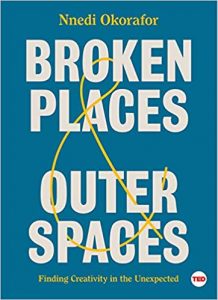 All three Binti novellas were gathered together in one volume, to mark another amazing year for Nnedi Okorafor. She announced Africanfuturist Productions, a company focussing on producing television. Her book Broken Places & Outer Spaces appeared. Her comic for Marvel, Shuri: The Search for Black Panther won the 2019 Nommo Award for Graphic Novel by an African.
All three Binti novellas were gathered together in one volume, to mark another amazing year for Nnedi Okorafor. She announced Africanfuturist Productions, a company focussing on producing television. Her book Broken Places & Outer Spaces appeared. Her comic for Marvel, Shuri: The Search for Black Panther won the 2019 Nommo Award for Graphic Novel by an African.
African writers are left with a choice: write for the home audience or publish in the West. It often seems that they are disregarded at home until they have success abroad. It’s great that Western publications are so interested in work by Africans, but can cultures tell their stories in their own voices if they have first to appeal to editors and readers on other continents?
To open discussion a bit, here are South African writer Mandisi Nkomo and Chinelo Onwualu discussing this issue on Facebook in the African Science Fiction and Fantasy Reading Group.
Mandisi Nkomo: “I think it’s complicated. Western outlets are the ‘path of least resistance’ for acclaim and payment to a certain extent. Especially here in South Africa, where much of the bigger industries follow Western trends a lot. You’d have to build your own publishing platforms, and somehow get the mainstream South African media to give a shit. In some ways the other way round is easy. I assume people are doing constant cost-benefit analysis between improving career prospects vs. the sacrifices required to build an African Literature.”
Chinelo Onwualu: “I think what happens is that because we often lack capacity – whether that’s physical infrastructure or human capital – it’s often easier to build clout abroad and then come home where you’re then more likely to be taken seriously and given a chance to make changes. Sadly as Mandisi rightly points out we don’t often take our own talents seriously until they’ve been crowned by the West.”
This and more like it in the February 2020 issue of Locus.
 While you are here, please take a moment to support Locus with a one-time or recurring donation. We rely on reader donations to keep the magazine and site going, and would like to keep the site paywall free, but WE NEED YOUR FINANCIAL SUPPORT to continue quality coverage of the science fiction and fantasy field.
While you are here, please take a moment to support Locus with a one-time or recurring donation. We rely on reader donations to keep the magazine and site going, and would like to keep the site paywall free, but WE NEED YOUR FINANCIAL SUPPORT to continue quality coverage of the science fiction and fantasy field.





